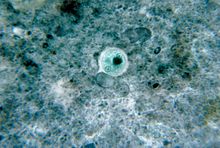- Microbial cyst
-
 Cyst stage of Entamoeba histolytica
Cyst stage of Entamoeba histolytica
A microbial cyst is a resting or dormant stage of a microorganism, usually a bacterium or a protist, that helps the organism to survive in unfavorable environmental conditions. It can be thought of as a state of suspended animation in which the metabolic processes of the cell are slowed down and the cell ceases all activities like feeding and locomotion. Encystment also helps the microbe to disperse easily, from one host to another or to a more favorable environment. When the encysted microbe reaches an environment favorable to its growth and survival, the cyst wall breaks down by a process known as excystation.
Unfavorable environmental conditions such as lack of nutrients or oxygen, extreme temperatures, lack of moisture and presence of toxic chemicals, which are not conducive for the growth of the microbe [1] trigger the formation of a cyst.
Contents
Cyst formation in bacteria
In bacteria (for instance, Azotobacter sp.), encystment occurs by changes in the cell wall; the cytoplasm contracts and the cell wall thickens. Bacterial cysts differ from endospores in the way they are formed and also the degree of resistance to unfavorable conditions. Endospores are much more resistant than cysts.
Cyst formation in protists
Protists, especially protozoan parasites, are often exposed to very harsh conditions at various stages in their life cycle. For example, Entamoeba histolytica, a common intestinal parasite that causes dysentery, has to endure the highly acidic environment of the stomach before it reaches the intestine and various unpredictable conditions like desiccation and lack of nutrients while it is outside the host.[2] An encysted form is well suited to survive such extreme conditions, although protozoan cysts are less resistant to adverse conditions compared to bacterial cysts.[1] In addition to survival, the chemical composition of certain protozoan cyst walls may play a role in their dispersal. The sialyl groups present in the cyst wall of Entamoeba histolytica confers a net negative charge to the cyst which prevents its attachment to the intestinal wall[3] and thus causing its elimination in the feces. Other protozoan intestinal parasites like Giardia lamblia and Cryptosporidium also produce cysts as part of their life cycle. In some protozoans, the unicellular organism multiplies during or after encystment and releases multiple trophozoites upon excystation.[2]
Cyst formation in nematodes
Some soil-dwelling plant parasitic nematodes, such as the soybean cyst nematode, or the potato cyst nematode form cysts as a normal part of their lifecycle.
Composition of the cyst wall
The composition of the cyst wall is variable in different organisms. The cyst walls of bacteria are formed by the thickening of the normal cell wall with added peptidoglycan layers whereas the walls of protozoan cysts are made of chitin,[3] a type of glycoprotein. Nematode cyst walls are composed of chitin reinforced by collagen.
See also
References
- ^ a b Eugene W. Nester, Denise G. Anderson, C. Evans Roberts Jr., Nancy N. Pearsall, Martha T. Nester; Microbiology: A Human Perspective, 2004, Fourth Edition, ISBN 0072919248
- ^ a b Samuel Baron MD, Rhonda C. Peake, Deborah A. James, Mardelle Susman, Carol Ann Kennedy, Mary Jo Durson Singleton, Steve Schuenke; Medical Microbiology; Fourth Edition, ISBN 0-9631172-1-1 (hardcover)1996
- ^ a b Anuradha Guha-Niyogi, Deborah R. Sullivan and Salvatore J. Turco; Glycoconjugate structures of parasitic protozoa; Glycobiology, 2001, Vol. 11, No. 4 45R-59R
Categories:
Wikimedia Foundation. 2010.
